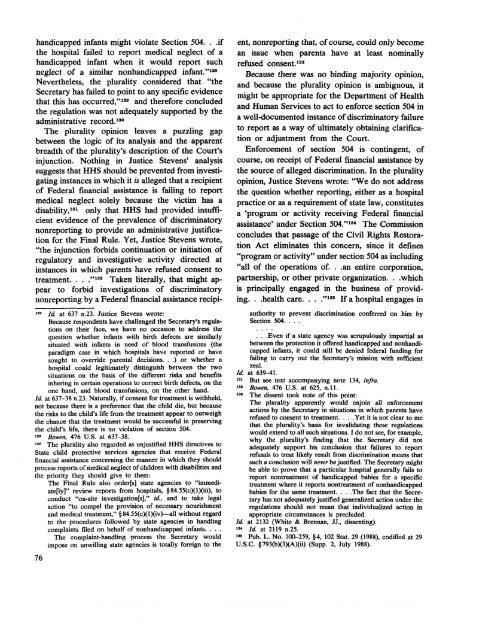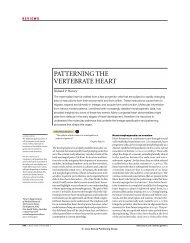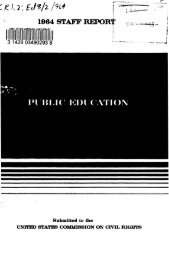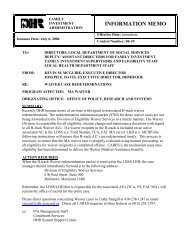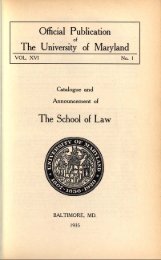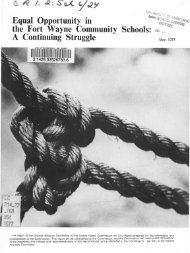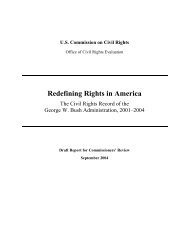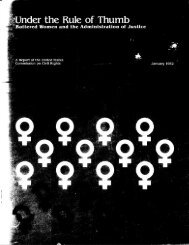handicapped infants might violate Section 504. . .ifthe hospital failed to report medical neglect <strong>of</strong> ahandicapped infant when it would report suchneglect <strong>of</strong> a similar nonhandicapped infant" 128Nevertheless, the plurality considered that "theSecretary has failed to point to any specific evidencethat this has occurred," 129 and therefore concludedthe regulation was not adequately supported by theadministrative record. 130The plurality opinion leaves a puzzling gapbetween the logic <strong>of</strong> its analysis and the apparentbreadth <strong>of</strong> the plurality's description <strong>of</strong> the Court'sinjunction. Nothing in Justice Stevens' analysissuggests that HHS should be prevented from investigatinginstances in which it is alleged that a recipient<strong>of</strong> Federal financial assistance is failing to reportmedical neglect solely because the victim has adisability, 131 only that HHS had provided insufficientevidence <strong>of</strong> the prevalence <strong>of</strong> discriminatorynonreporting to provide an administrative justificationfor the Final Rule. Yet, Justice Stevens wrote,"the injunction forbids continuation or initiation <strong>of</strong>regulatory and investigative activity directed atinstances in which parents have refused consent totreatment. . . ." 132 Taken literally, that might appearto forbid investigations <strong>of</strong> discriminatorynonreporting by a Federal financial assistance recipi-128Id. at 637 n.23. Justice Stevens wrote:Because respondents have challenged the Secretary's regulationson their face, we have no occasion to address thequestion whether infants with birth defects are similarlysituated with infants in need <strong>of</strong> blood transfusions (theparadigm case in which hospitals have reported or havesought to override parental decisions. . .) or whether ahospital could legitimately distinguish between the twosituations on the basis <strong>of</strong> the different risks and benefitsinhering in certain operations to correct birth defects, on theone hand, and blood transfusions, on the other hand.Id. at 637-38 n.23. Naturally, if consent for treatment is withheld,not because there is a preference that the child die, but becausethe risks to the child's life from the treatment appear to outweighthe chance that the treatment would be successful in preservingthe child's life, there is no violation <strong>of</strong> section 504.129Bowen, 476 U.S. at 637-38.130The plurality also regarded as unjustified HHS directives toState child protective services agencies that receive Federalfinancial assistance concerning the manner in which they shouldprocess reports <strong>of</strong> medical neglect <strong>of</strong> children with disabilities andthe priority they should give to them:The Final Rule also order[s] state agencies to "immediate[ly]"review reports from hospitals, §84.55(c)(l)(iii), toconduct "on-site investigation[s]," id., and to take legalaction "to compel the provision <strong>of</strong> necessary nourishmentand medical treatment," § 84.55(c)(l)(iv)—all without regardto the procedures followed by state agencies in handlingcomplaints filed on behalf <strong>of</strong> nonhandicapped infants. . . .The complaint-handling process the Secretary wouldimpose on unwilling state agencies is totally foreign to the76ent, nonreporting that, <strong>of</strong> course, could only becomean issue when parents have at least nominallyrefused consent. 133Because there was no binding majority opinion,and because the plurality opinion is ambiguous, itmight be appropriate for the Department <strong>of</strong> Healthand Human Services to act to enforce section 504 ina well-documented instance <strong>of</strong> discriminatory failureto report as a way <strong>of</strong> ultimately obtaining clarificationor adjustment from the Court.Enforcement <strong>of</strong> section 504 is contingent, <strong>of</strong>course, on receipt <strong>of</strong> Federal financial assistance bythe source <strong>of</strong> alleged discrimination. In the pluralityopinion, Justice Stevens wrote: "We do not addressthe question whether reporting, either as a hospitalpractice or as a requirement <strong>of</strong> state law, constitutesa 'program or activity receiving Federal financialassistance' under Section 504." 134 The Commissionconcludes that passage <strong>of</strong> the Civil Rights RestorationAct eliminates this concern, since it defines"program or activity" under section 504 as including"all <strong>of</strong> the operations <strong>of</strong>. . .an entire corporation,partnership, or other private organization. . .whichis principally engaged in the business <strong>of</strong> providing.. .health care. . . ," 135 If a hospital engages inauthority to prevent discrimination conferred on him bySection 504. .... . .Even if a state agency was scrupulously impartial asbetween the protection it <strong>of</strong>fered handicapped and nonhandicappedinfants, it could still be denied federal funding forfailing to carry out the Secretary's mission with sufficientzeal.Id. at 639-41.131But see text accompanying note 134, infra.132133Bowen, 476 U.S. at 625, n.ll.The dissent took note <strong>of</strong> this point:The plurality apparently would enjoin all enforcementactions by the Secretary in situations in which parents haverefused to consent to treatment. . . .Yet it is not clear to methat the plurality's basis for invalidating these regulationswould extend to all such situations. I do not see, for example,why the plurality's finding that the Secretary did notadequately support his conclusion that failures to reportrefusals to treat likely result from discrimination means thatsuch a conclusion will never be justified. The Secretary mightbe able to prove that a particular hospital generally fails toreport nontreatment <strong>of</strong> handicapped babies for a specifictreatment where it reports nontreatment <strong>of</strong> nonhandicappedbabies for the same treatment. . . .The fact that the Secretaryhas not adequately justified generalized action under theregulations should not mean that individualized action inappropriate circumstances is precluded.Id. at 2132 (White & Brennan, JJ., dissenting).134Id. at 2119 n.25.135Pub. L. No. 100-259, §4, 102 Stat. 29 (1988), codified at 29U.S.C. §793(b)(3)(A)(ii) (Supp. 2, July 1988).
eporting cases <strong>of</strong> medical neglect to the State childprotective services agency, that is part <strong>of</strong> theoperations <strong>of</strong> a corporation that principally provideshealth care; if any part <strong>of</strong> the hospital receivesmedicaid or medicare, discrimination based on handicapin the reporting operation, therefore, violatessection 504.Importance <strong>of</strong> Section 504 EnforcementAlthough there is another basis for Federal enforcement<strong>of</strong> the right to treatment <strong>of</strong> children bornwith disabilities—the Child Abuse Amendments <strong>of</strong>1984, 136 which are described in the next chapterenforcement<strong>of</strong> section 504 would provide certainadvantages not present in the Child Abuse Amendmentsalone. For one, section 504 reaches medicaldiscrimination against people with disabilities <strong>of</strong> anyage; unlike the Child Abuse Amendments, its coverageis not limited to children. For another, the ChildAbuse Amendments apply only to States that chooseto accept Federal funding for their child abuseprograms. 137 In fiscal year 1988, four States—including California, the Nation's most populous—were not covered by the amendments. 138 Even inthe other States, there are a number <strong>of</strong> ways inwhich the amendments are inferior to section 504 inprotecting against medical discrimination. As JamesBopp, Jr., a member <strong>of</strong> the President's Commissionon Mental Retardation and the director <strong>of</strong> a legalservices program specializing in denial <strong>of</strong> medicaltreatment to people with disabilities, testified:[T]he remedies available in Section 504 are superior. TheChild Abuse Amendments <strong>of</strong> 1984 require, at the pain <strong>of</strong>loss <strong>of</strong> Federal funds, State child protective serviceagencies to act. That is quite in contrast with theapplication <strong>of</strong> Section 504, which provides a substantivelaw standard for the entities that are discriminating againstpersons with disabilities in the delivery <strong>of</strong> medical care,which are hospitals and hospital employees and otherswho are recipients <strong>of</strong> Federal financial assistance. So theChild Abuse Amendments are quite indirect in their abilityto influence the discrimination that is occurring withinhospitals. Pub. L. No. 98-457, tit. 1, §§ 121-28, 98 Stat. 1749, 1752-55(codified at 42 U.S.C.A. §§ 5101-5103 (West Supp. 1988)).137Protection <strong>of</strong> Handicapped Newborns: Hearing Before the UnitedStates Commission on Civil Rights 35 (1986) (vol. II) (testimony <strong>of</strong>James W. Ellis, <strong>School</strong> <strong>of</strong> <strong>Law</strong>, <strong>University</strong> <strong>of</strong> New Mexico).Accord, id. at 159 (testimony <strong>of</strong> James Bopp, Jr., President,National Legal Center for the Medically Dependent and Disabled).138Telephone interview with Mary McKough, Program Analyst,National Center for Child Abuse and Neglect, DepartmentSecond, section 504 provides for private remedies,remedies where a child who is denied treatment can go toFederal court and insist upon treatment if a hospital woulddeny treatment or, second, may seek damages to compensatehim for his injuries.Third, actions by State child abuse and neglect agenciesonly occur on a case-by-case basis. Section 504, incontrast, can be the subject <strong>of</strong> a class action. . . .TheChild Abuse Amendments only would involve a case-bycaseprotection <strong>of</strong> then-alive infants that are deniedtreatment, whereas under section 504 you can get injunctiverelief to prohibit the hospital from using this form <strong>of</strong>criteria and protect all future infants. 139The Commission heard revealing testimony frompediatric neurologist Dr. Patricia Ellison concerningthe comparative effect <strong>of</strong> the section 504 regulationsand those under the Child Abuse Amendments <strong>of</strong>1984. When the section 504 rules were issued, shesaid, discussions about stopping lifesaving treatmentin the neonatal intensive care unit "promptlyceased." Because physicians feared getting intotrouble, "They treat[ed], and they continue[d] totreat." By contrast, under the Child Abuse Amendments,because physicians have "long worked withpeople in child abuse[,]. . .we would be surprised ifit were an overwhelmingly interfering system.. .and one doesn't expect that they will bedoing a lot <strong>of</strong> newborn investigation by andlarge." 140It creates a strange anomaly for the FederalGovernment to mandate that State agencies enforcedetailed national standards that forbid medical discrimination,while permitting Federal funds to beused for programs that are engaged in the samediscrimination. The Federal Government enforcesracial and sexual antidiscrimination standards forrecipients <strong>of</strong> its funds; it should do the same toprevent medical discrimination against persons withdisabilities.ConclusionThe Commission's reading <strong>of</strong> the legislative historyand plain meaning <strong>of</strong> section 504 persuade it that<strong>of</strong> Health and Human Services (Dec. 2, 1988). Ohio receivedfunds in prior fiscal years, but was denied FY 1988 funds forreasons unrelated to the Baby Doe requirements. Id.189Protection <strong>of</strong> Handicapped Newborns: Hearing Before the UnitedStates Commission on Civil Rights 162 (1986) (vol. II) (testimony<strong>of</strong> James Bopp, Jr., President, National Legal Center for theMedically Dependent and Disabled).140Id. at 240-41 (testimony <strong>of</strong> Patricia Ellison, M.D.). Dr.Owens concurred. Id. at 241 (testimony <strong>of</strong> Walter Owens, M.D.,Bloomington Obstetrics and Gynecology, Inc.).77
- Page 1 and 2:
MedicalDiscriminationAgainstChildre
- Page 3 and 4:
idments • Section 504 • Medical
- Page 5:
LETTER OF TRANSMITTALThe PresidentT
- Page 9 and 10:
CONTENTSExecutive Summary 11. Funda
- Page 11:
12. The Performance of the Federal
- Page 14 and 15:
• The role of economic considerat
- Page 16 and 17:
disabilities at the time that the c
- Page 19 and 20:
generated by health care personnel
- Page 21:
ing how they would obtain medical r
- Page 24 and 25:
The Commission sees several advanta
- Page 26 and 27:
acquiescence in the death or elimin
- Page 28 and 29:
Services of the Department of Healt
- Page 30 and 31:
Chapter 1Fundamental Rights: An Int
- Page 32 and 33:
Carlton Johnson was evaluated by a
- Page 34 and 35:
"that Mr. and Mrs. Doe, after havin
- Page 36 and 37:
American Coalition of Citizens with
- Page 38 and 39: Chapter 2The Physician-Parent Relat
- Page 40 and 41: In all but a few cases, the parents
- Page 42 and 43: the family, and the family went alo
- Page 44 and 45: Chapter 3The Role of Quality of Lif
- Page 47: transition from education to employ
- Page 50 and 51: tion programs can become productive
- Page 52 and 53: unsuccessful efforts of a private a
- Page 54 and 55: [S]ince I have been at Children's M
- Page 56 and 57: Another survey by Siperstein, Wolra
- Page 58 and 59: of life with a child who is disable
- Page 60 and 61: Chapter 4The Role of Economic Consi
- Page 62 and 63: ©TABLE 4.1Pediatricians' Responses
- Page 64 and 65: • The differences in average cost
- Page 66 and 67: FIGURE 4.1Comparative Costs of Inst
- Page 68 and 69: Chapter 5State LawWhat is the law g
- Page 70 and 71: Like all authority. . .parental aut
- Page 72 and 73: This decision, however, was promptl
- Page 74 and 75: No otherwise qualified handicapped
- Page 76 and 77: Bloomington's Infant Doe in April 1
- Page 78 and 79: ONONTABLE 6.1Physician's assessment
- Page 80 and 81: Essentially, HHS interpreted the su
- Page 82 and 83: Final 504 RuleHHS received nearly 1
- Page 84 and 85: lifesaving operations to close her
- Page 86 and 87: any further implementation of the F
- Page 90 and 91: the provision does cover discrimina
- Page 92 and 93: of the infants. The review mechanis
- Page 94 and 95: Under the law, the Department of He
- Page 96 and 97: that "the phrase 'or holds the reas
- Page 98 and 99: allows an infant to be denied nutri
- Page 100 and 101: avoid the explicit standards set fo
- Page 102 and 103: (as opposed to the far) future, the
- Page 104 and 105: It was recognized, therefore, that
- Page 106 and 107: als with the particular disability
- Page 108 and 109: cared for. They are thus different,
- Page 110 and 111: medical advice. Given the magnitude
- Page 112 and 113: tions at all regarding the subject
- Page 114 and 115: strates that there is a grave dange
- Page 116 and 117: Disincentives to Whistle BlowingDen
- Page 118 and 119: Using a cumulative scaling procedur
- Page 120 and 121: Of that 300 we targeted, approximat
- Page 122 and 123: Conclusionphysicians set forth in t
- Page 124 and 125: taking place when a report of suspe
- Page 126 and 127: where the parents say "the child fe
- Page 128 and 129: Nevertheless, the organization oppo
- Page 130 and 131: Chapter 11The Role and Performance
- Page 132 and 133: a member of the American Academy of
- Page 134 and 135: possibilities that "will be most li
- Page 136 and 137: clearly indicate that the committee
- Page 138 and 139:
Reviewing the first 30 months of th
- Page 140 and 141:
Webster's defines "suspected" as "t
- Page 142 and 143:
Chapter 12The Performance of the Fe
- Page 144 and 145:
The baby's doctor, E. Laurence Hode
- Page 146 and 147:
to achieve a reasonable life". . .w
- Page 148 and 149:
an unmarried mother receiving welfa
- Page 150 and 151:
can be sure all appropriate actions
- Page 152 and 153:
inquiries to determine whether they
- Page 154 and 155:
Chapter 13The Protection and Advoca
- Page 156 and 157:
authority to conduct retrospective
- Page 158 and 159:
facility that uses such a committee
- Page 160 and 161:
Chapter 14Findings and Recommendati
- Page 162 and 163:
as the coordination and development
- Page 164 and 165:
in the advisory process who is conc
- Page 166 and 167:
A Dissenting View on the Report Med
- Page 168 and 169:
arts) to depend upon knowledge of h
- Page 170 and 171:
Attachments to Statement of William
- Page 172 and 173:
medical facility. Considerations su
- Page 174 and 175:
Fund for the Improvement of Postsec
- Page 176 and 177:
eports such as Kopelman et al. demo
- Page 178 and 179:
Appendix 1EXPOSING OUR CHILDREN, EX
- Page 180 and 181:
abilities or functions, they are de
- Page 182 and 183:
My principal reason for objecting t
- Page 184 and 185:
I derive this hint from the many co
- Page 186 and 187:
moral distinction. A girl is a huma
- Page 188 and 189:
Appendix 2SURVEY OFSTATE BABY DOE P
- Page 190 and 191:
insure the immediate referral of po
- Page 192 and 193:
Hospital Liaisons Designated in Mos
- Page 194 and 195:
BABY DOE COMPARED WITH REGULAR CPS
- Page 196 and 197:
We also asked state CPS offices wha
- Page 198 and 199:
Limited information was available o
- Page 200 and 201:
one-quarter felt that baby doe case
- Page 202 and 203:
Appendix 3INFANT CARE REVIEW COMMIT
- Page 204 and 205:
and guidelines concerning the withh
- Page 206 and 207:
treated to assure the prompt ^repor
- Page 208 and 209:
3. Educating Staff and FamiliesThre
- Page 210 and 211:
One of the 10 ethics committees vis
- Page 212 and 213:
asphyxiation during the birth proce
- Page 214 and 215:
Prospective Review -- Each committe
- Page 216 and 217:
OBSERVATIONSThe inspection found th
- Page 218 and 219:
May 1, 1989Page 2The Commission adv
- Page 220 and 221:
Doe 1 admitted on the record of the
- Page 222 and 223:
tion is the basis for failure to tr
- Page 224:
her (much appreciated) vote for thi


